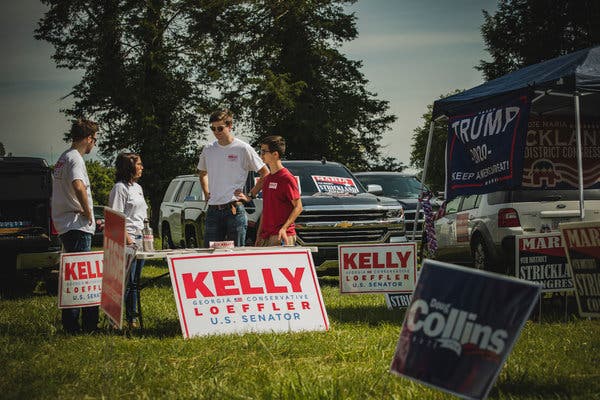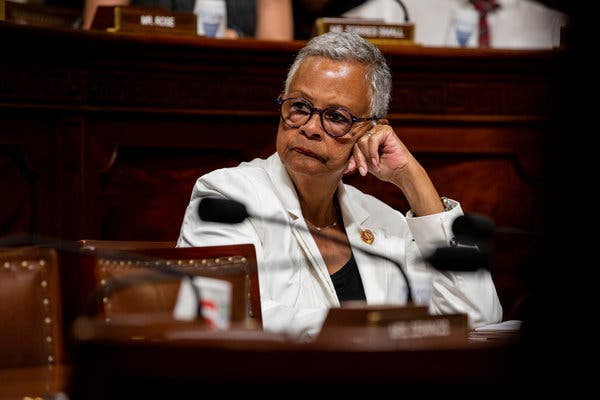Advertisement
This November, the uneasy relationship between the most right-wing voters in the Republican Party and the statewide lawmakers who rely on their votes will burst into the open.

DILLARD, Ga. — As Representative Doug Collins went booth to booth at a recent Republican jamboree in northeast Georgia’s Rabun County, he was a hero, not an insurgent. No one knocked him for splitting the party with his bid against the state’s junior senator, Kelly Loeffler, who is also a Republican. For many voters in the deeply conservative region, Mr. Collins was the candidate who most represented the values of their political icon: President Trump.
This feeling — that the Republican base understands Trumpism and its best messengers better than G.O.P. leaders — is shaping the race in Georgia, as well as another Senate battleground contest this year in Arizona. There, Senator Martha McSally, a Republican, faces not only a energized Democratic electorate but a skeptical right-wing base. In both states, Republican governors appointed the senators, who now have to win their seats for themselves in November’s election.
In Georgia, many grass-roots conservatives are still bitter that Gov. Brian Kemp appointed Ms. Loeffler over Mr. Collins to the Senate in 2019 in what they say was a sop to the state’s Republican business and consultant class. They hope to soon right that wrong.
“I’m not opposed to the sitting senator, I’m just for Doug Collins,” said Lauren “Bubba” McDonald Jr., a member of the state’s public service commission whose local claim to fame was being the only statewide elected official to endorse Mr. Trump early in the 2016 Republican primary.
Mr. McDonald, who pointed to Mr. Collins’s fierce performance on the Judiciary Committee during Mr. Trump’s impeachment hearings, added, “Think of it this way: we have no reason not to support Doug Collins.”
In an interview, Mr. Collins summed up the race this way: “The biggest issue here is I’m the right person for Georgia.”
Many Republican candidates face a perplexing electoral landscape this year, given that Mr. Trump’s conduct has endeared him to the party’s most conservative groups, but has soured some suburban moderates and seniors who are vital parts of any swing state coalition. These candidates are walking a tightrope, made more difficult by a voter base that doesn’t just want to elect Republicans, but rather loyal foot soldiers who take on Mr. Trump’s political and cultural enemies.
It is the long-term political war over how Trumpism is best expressed — not the short-term battle over Mr. Trump himself — and how a party that has been driven by early-morning tweets for four years will seek to survive the next 40.
In the run-up to the 2018 midterm elections, a record number of House Republicans chose not to seek re-election rather than face conflict with the conservative base, and even a favorable Senate map saw Republicans lose in states like Arizona and Nevada.
With Mr. Trump on the ballot this year, it will be even harder for candidates to paper over the differences, and the uneasy relationship between the party’s most right-wing voters and the statewide Republicans like Ms. Loeffler and Ms. McSally who rely on their votes is bursting into the open.

Governors in both Arizona and Georgia are currently confronting this political challenge, after opening up their states’s economies at the urging of the president and those in the media who support him, only to face pressure to reverse course after coronavirus cases surged.
Polling also shows that Ms. Loeffler and Ms. McSally are underdogs in their respective races, facing an energized Democratic electorate in addition to their inner-party wrangling. Ms. Loeffler and Ms. McSally, and the governors who appointed them, declined or did not respond to requests to be interviewed for this story.
In the Georgia special election set for Nov. 3, which will not have a primary and will pit several Democrats and Republicans against each other on one ballot, Mr. Collins has led almost every public and private poll, with Ms. Loeffler and several Democrats behind him. (The winner must earn 50 percent of the vote to avoid a runoff.)
A recent survey of Arizona voters from The New York Times and Siena College found Ms. McSally trailing her Democratic opponent, the former astronaut and U.S. Navy Captain Mark Kelly, by nine percentage points.
In a recent Fox News poll of the Arizona race, just 73 percent of Republicans supported Ms. McSally, while 88 percent of Democrats supported Mr. Kelly.
“They don’t buy her as a bona fide very conservative Republican,” said Chuck Coughlin, a longtime Republican political consultant in Arizona.
The candidates’ struggles speak to how real divisions among Republicans have been obscured by Mr. Trump’s victory in 2016, and could erupt again should he lose in November.
Ms. McSally, in particular, faces pressure from a nativist faction that wants her to be more vocal on restricting immigration. The extreme wealth of Ms. Loeffler, who has a net worth in the hundreds of millions and is married to the chairman of the New York Stock Exchange, has become an issue in her race, particularly since she faced criticism for stock transactions that coincided with the early days of the coronavirus pandemic.
Allies of Ms. Loeffler point to recent polling that showed a closer race than initial surveys suggested. This week, the senator — who is also a co-owner of the W.N.B.A.’s Atlanta Dream — announced she opposed the league’s plan to allow players to wear warm-up jerseys reading “Black Lives Matter” and “Say Her Name,” a move some saw as an attempt to shore up her conservative credentials.
In a statement provided by a campaign spokesman, Ms. Loeffler said, “Georgians want a conservative outsider like me — not another career politician like Doug Collins who has sided with liberal democrats like Stacey Abrams to raise taxes, restrict 2nd Amendment rights, oppose term limits, and fund sanctuary cities.”
Several Republicans in Arizona and Georgia said in interviews that the problem is not with Ms. Loeffler’s or Ms. McSally’s messages, but whether the base is buying the candidates as authentic. As a sign of their shared troubles among Republicans, some of the most negative publicity for both senators in the past year has come courtesy of Fox News, the cable outlet that is often sympathetic to the president.
Ms. McSally was pressed repeatedly by the conservative host Laura Ingraham during Mr. Trump’s impeachment trial about whether she wanted the Senate to call witnesses, and refused to answer. Ms. Loeffler has denied wrongdoing regarding the stock transactions, but when news broke one of her largest detractors was another host, Tucker Carlson.
“We don’t know the truth,” Mr. Carlson said at the time, “But if she knew about these trades and still issued that little P.S.A. we showed you, she should leave office.”
He later had Ms. Loeffler on the show to explain the transactions.
Mr. Coughlin said Ms. McSally’s problems in Arizona were similar to the skepticism faced by former Senators John McCain and Jeff Flake, both Arizona Republicans who opposed Mr. Trump at times. In Mr. Trump’s Republican Party, it is difficult for any Republican — but particularly federal candidates in a presidential election year — to run from his shadow.
“The electorate has changed a lot,” Mr. Coughlin said, adding that the current Republican Party has “moved away from that narrative that people were originally attracted to. And in my view, has become one that’s reactive to the identity politics of the left.”
Stan Barnes, a former Republican member of the Arizona state legislature, said he expected more Republicans to support Ms. McSally as November draws nearer. Mr. Barnes argued that the current polling snapshot may look worse for Republicans across the country than what actually happens in the fall.
“The numbers will firm up as we get to November,” Mr. Barnes said. “People will start to focus and say, ‘Well, it’s not just about her but about the balance of the Senate.’ And Republican voters are unified around the idea that they don’t want Senator Chuck Schumer leading the U.S. Senate.”
During the interview at the Rabun County event, Mr. Collins expressed confidence in his campaign, declining to criticize Ms. Loeffler or Mr. Kemp’s decision to appoint her while also making clear the choice would soon be proven out of step with the state’s Republican voters.
Conventional political wisdom held that Mr. Kemp appointed Ms. Loeffler in an attempt to win over moderate suburban women, but Mr. Collins said conservative authenticity was the way to do that.
“This is about who is a conservative, who people know is tested and proven, and that’s me and not her,” Mr. Collins said.
There is some evidence Mr. Collins’s appeals are working. He is not only the preferred candidate in Rabun County, but he has landed the endorsement of former Representative Karen Handel, the one of the state’s most prominent Republican women and the party’s nominee in an all-important swing district in the Atlanta suburbs.
Ms. Handel is seeking to win back the seat she used to hold, in the Sixth Congressional District, from Representative Lucy McBath, a Democrat, in a closely watched House rematch. But instead of sitting out the Senate race or supporting the incumbent, Ms. Handel recently announced she was endorsing Mr. Collins, a sign that Ms. Loeffler’s attempts to consolidate Republican women have not taken root.
“He is the best person to represent our Georgia values,” Ms. Handel said in a statement. “Most importantly, I trust Doug — to stand up for life, to stand with our president, and to stand for our Georgia values.”
Whether Mr. Trump decides to endorse Mr. Collins or Ms. Loeffler will also have an effect on the campaign’s trajectory. Those in Mr. Collins’s camp express private optimism that the White House will let the race play out, particularly after early polling showed Mr. Collins was the likely preference of the president’s core base. However, Ms. Loeffler is aided by her personal wealth and the establishment Republican groups meant to protect incumbents, such as the National Republican Senatorial Committee.
At the event in Mr. Collins’s home district, where attendees were universally supportive of his candidacy, the prospect of Mr. Trump endorsing his opponent was unfathomable to some.
“We know Doug,” said Ethan Underwood, a local businessman who ran for the seat Mr. Collins is vacating, in the state’s Ninth District.
“And respectfully to Ms. Loeffler,” he added, “she hasn’t done anything.”
Ed Henderson, the Rabun County party secretary, noted that Ms. Loeffler had not held an event with the Republicans in the state’s Northeast region, including in its counties where support for Mr. Trump is strongest. (Ms. Loeffler did hold an event in nearby Hall County after Mr. Henderson made the remark.)
He downplayed the controversy over whether Ms. Loeffler had engaged in insider trading, but said her absence in the region had contributed to the perception that she was a wealthy Atlanta Republican, not a grass-roots Georgia one.
“Senator Loeffler, we would love to see you in the Ninth District,” Mr. Henderson said.
He then threw in a reference to Ms. Loeffler’s private aircraft. “You can bring your plane here,” he said. “We have an airfield.”
-
- Days before President Trump’s rally in New Hampshire, the only thing that seems clear is that the president’s team has no idea what to expect.
-
- Here are 13 women who have been under consideration to be Joe Biden’s running mate, and why each might be chosen — and might not be.
-



